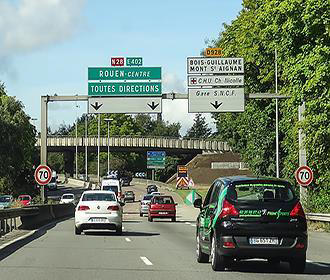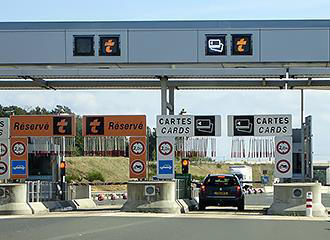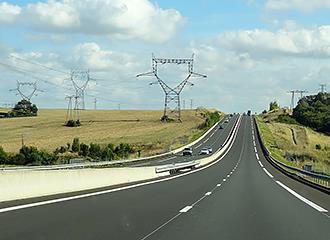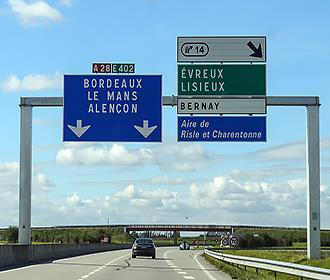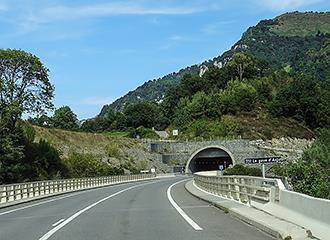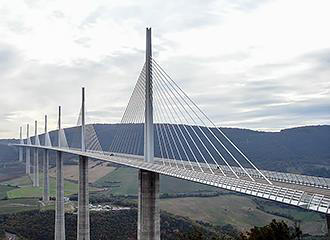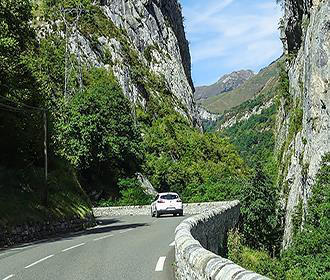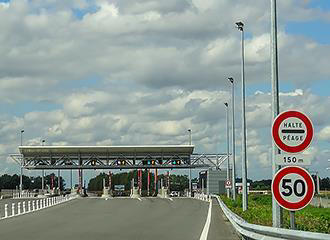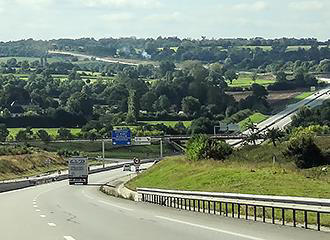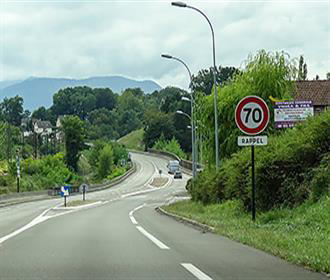General regulations for driving in France - Pre Brexit
See the new UK Post Brexit travel regulations
Whether you are touring with a caravan or driving a motorhome through France there are some points that you must think about to make your trip go smoothly.
Driving in France can be a fantastic experience that you will never forget, especially getting to see some of the historical towns and quaint villages, but we have put together some tips and guidelines to hopefully keep you out of trouble!
Now the first and probably the most obvious one, is that in many countries every passenger must wear a seatbelt. But in France it is also illegal for a child under the age of 10 to be in the front passenger seat.
Driving Licences
One point you may not know, is that the legal age to drive in France is 18 years of age? So even if you passed your driving test in the UK at the age of 17, you still cannot drive in France until you are 18.
You must also carry your driving licence with you at all times and these days it also advisable to have one of the photocard driving licences (and this is the preferred form of ID for many countries when purchasing goods).
If you do have one of the old green style driving licences then it is highly recommended to update this to a photocard licence or obtain an International Driving Permit so that you do not get into any difficulties as many places will or may not recognise the old style licence.
Also, you are not allowed to drive in France on a Provisional licence.
Plus if you have only had your full driving licence for two years or less, then you must abide by the bad weather conditions speed limits, which are shown on motorways and dual carriageways and are as mentioned below.
Additional documents when driving in France
Every person travelling with you on holiday to France must have a valid passport including children and any pets.
You must also carry the V5 car log book, the MOT certificate if this is applicable and of course a valid certificate of motor insurance, but please bear in mind that even if you have Comprehensive cover on your policy you may only be covered Third Party in Europe unless you upgrade your car insurance policy.
If towing your caravan then you should also carry your CRIS document.
Also, everyone in your party should have a European Health Insurance Card and hopefully this will never be needed, but accidents do happen!
When it comes to travelling with pets, there are numerous campsites in France that do allow your four-legged companions as well, but you also need to be able to prove that not only do they have a passport, but their injections are all up to date. Many French campsites also state that you must have an anti-rabies certificate for any pets as well.
A Camping Card International is an identity card that is widely recognised throughout Europe and it is advisable to have one as this is a form of ID that some campsites will keep hold of during your stay. Also, some of the campsites in France will offer a discount to those that can produce the CCI.
And even though the original documents need to be carried, we would advise taking photocopies of all of these including your passports and credit cards, then keep a copy at home, preferably with a relative that you can contact in an emergency and another copy with you in a safe place, and separate to the originals, just in case anything gets lost or stolen.
Equipping your car
The first thing you need to do is make sure that you have headlight deflectors for your lights so that you do not dazzle other motorists, as you will obviously be driving on the opposite side of the road.
The second is to have a GB sticker on your vehicle and also another on the caravan or trailer if you are towing.
A more recent regulation that France has introduced is a clean air sticker, which is called a Crit-Air vignette, that must be displayed on your windscreen to identify a vehicle's emissions levels, which you can read more about below.
It is also a legal requirement to have the following in your car:
- Emergency triangle, although in some EU countries two / three are required.
- Reflective safety jackets for each passenger.
- Two Breathalysers.
- Fire extinguisher.
- First aid kit including needles.
- Replacement bulb kit (s).
- Spare wheel.
- Replacement fuses.
- Extending Mirrors if towing a caravan.
Crit'Air vignette
Designed to help control air pollution, not only is the sticker a legal requirement for all French drivers, but this is now a legal requirement for any person driving in France to have this clean air sticker when venturing into certain cities or zones, although it is not a legal requirement throughout the entire country as yet.
You will find that there are 6 colour coded stickers that define the category of your vehicle and its emissions, which range from the colour green to show these are the greenest of vehicles through to a darkish grey colour for the most polluting vehicles, and in certain areas or certain days, etc, the most polluting of vehicles will not be allowed access to specific areas.
When you are entering a clean air zone you will see a sign with a red circle that states Circulation Restreinte below, and when the zone finishes, Fin de Zone in French, this will be a grey circle crossed through.
As a recent addition to the already comprehensive regulations, some of the popular cities such as Lyon, Toulouse, Strasbourg, Marseille and the capital city of France, Paris, already have this system in place, and if you do not have a sticker you could end up with an on the spot fine of approximatly €120.
There is only one official place to obtain your Air Quality Certificate sticker, which is the from the French Government for a cost of €3.11 plus postage to your home address, so do be aware of scams and companies charging many Euros more.
You can order your clean order sticker here: https://www.certificat-air.gouv.fr/en
But we would like to point out that it can take up to around six weeks to arrive, so it is wise to plan ahead before starting your holiday in France.
Road speed limits
When it comes to speed limits the motorways are 130km per hour, but this is reduced in bad weather down to 110km per hour.
A dual carriageway is 110km per hour and main roads were 90km per hour, but as of July 2018 this has been lowered to 80km per hour for any road that does not have a barrier in the middle, which is now the same speed as the periphery at 80km per hour. But in bad weather the same rule as a motorway applies, where the speed limit is reduced.
Towns or minor roads are a maximum of 50km per hour, although you will find that some roads will be less.
The above speed limits are for private cars even if towing a caravan providing that the stated total gross weight of the whole outfit is less than 3,500kg.
If you are above that weight, then the speed limit is reduced as you are classed as a heavy goods vehicle. For example, the max speed on a motorway for HGVs is 90km per hour.
But make sure you watch your speed!
If you are stopped for speeding you can be fined on the spot and the fines have to be paid in cash there and then, which can be quite expensive. Now, if you cannot pay or you are travelling more than 25km/h above the legal speed limit, then your car can be impounded and you could end up with a very hefty fine or even lose your licence, so do be careful, especially when on the toll roads, as you do not want your camping holiday in France to come to an abrupt end!
The French Government do publish information on exactly where speed traps are located and this is one of the reasons why it is illegal to have a radar detector fitted to your vehicle.
Also, there are lots of satellite navigation systems on the market that have a warning system for speed cameras, but it is also illegal to have this facility on, otherwise you could end up with a hefty fine if you are caught out and if you cannot pay on the spot, your vehicle could be confiscated.
Driving Lights
As mentioned earlier, you must have deflectors if in a right-hand drive vehicle.
In bad weather, fog etc, even during the day, it is compulsory to use your lights but you do not have to keep your lights on during the day at any other time other than if you are towing or going through a tunnel.
People will flash their lights if they have the right of way or if they are on a motorway to let you know that they are coming up quickly. This is the normal practice instead of using a horn, so do not be alarmed, but at the same time, it is also a warning for you to get out of the way.
Alcohol
The legal limit of alcohol in the blood is actually less in France than it is within the UK. In theory you should think about a policy of no drink at all to be on the safe side, as the penalties for drink driving can be severe, plus the police often carry out spot checks and random breath tests as we have seen when we have been on camping holidays in France.
Accidents
In France the law states that if you are the first to arrive on a scene of any road accident, you must stop and provide assistance, and you have a duty to call the police immediately, who will then also notify the fire brigade and ambulance services if these are also necessary.
We mentioned earlier about some of the items you must carry by law and you may well need these to provide assistance, whether it be extinguishing a small fire or even providing first aid treatment.
If it is you involved in an accident, then the obvious thing is to call the police straight away. But you should always have an European Accident statement form that you can obtain from your insurance company that will make your life easier.
Breakdowns
If you happen to break down whilst in any of regions in France, the first thing you should do is to put out at least one warning triangle (the legal requirement) at around 30 metres from the scene, but it is recommended to use two.
If you need assistance and you are on a motorway then you must call the police and they will instruct a breakdown truck, which can obviously be done through your mobile phone or via one of the emergency telephones, which you will see along the roadside. Again, even if you are in a motorway service area, you must still call the police in order to obtain a breakdown service.
Motorway assistance charges are calculated by the government and are fixed rates for breakdown and any towing services required, but we would like to point out that no breakdown service vehicle will enter the motorway system without having police authority first.
But by planning your camping holiday in France prior to travelling will give you more peace of mind and with these few general rules out of the way, just enjoy the experience, the beautiful scenery, the French wine and food and have a great family vacation at one of the many lovely French campsites.
However, please do bear in mind that driving regulations can change and these are a general guide, so it would be advisable to check everything in detail prior to your journey abroad.
